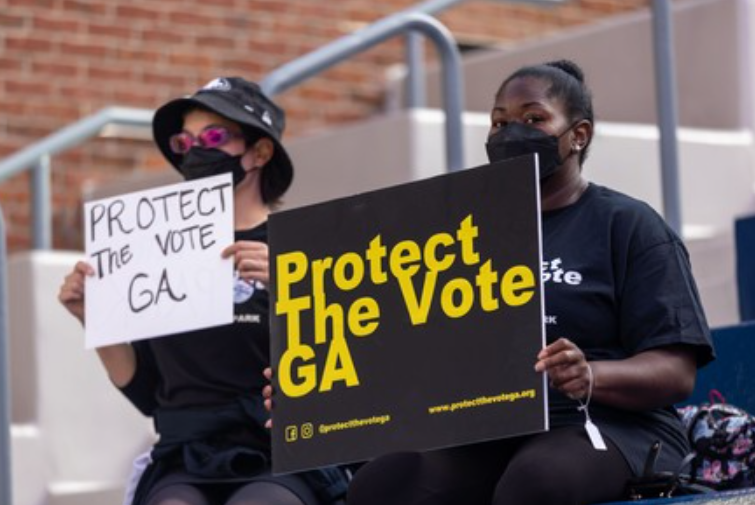Georgia Voting Law Ruled Unconstitutional
On December 24, 2024, a significant ruling emerged from the federal court in Atlanta, Georgia, as Judge Rachel Simmons declared the state’s restrictive voting law unconstitutional. This landmark decision, grounded in violations of the Voting Rights Act and the Fourteenth Amendment, marks a pivotal victory for voting rights advocates across the nation. The law, which had been enacted in 2022, implemented stringent identification requirements for voters, minimized the availability of ballot drop boxes, and hindered early voting opportunities, particularly affecting marginalized communities.
The Ruling and Its Implications
Judge Simmons’s ruling specifically highlighted the detrimental impact of the law on minority and low-income voters. The judge noted that the absence of credible evidence supporting claims of widespread voter fraud elevated concerns regarding the law’s intentions and consequences. In her decision, she emphasized, “The right to vote is a cornerstone of democracy and must be protected from unnecessary and discriminatory barriers.” By pointing out the law’s disproportionate burden on vulnerable populations, the judge reinforced the essential principle that equitable access to voting is fundamental to a functioning democracy.
Reactions from Civil Rights Advocates
The ruling spurred widespread celebration among civil rights organizations and leaders. Stacey Abrams, the renowned voting rights advocate and founder of Fair Fight Action, lauded the court’s decision as a critical affirmation of democratic principles. She remarked, “This decision ensures that every Georgian has an equal opportunity to make their voice heard.” Such responses highlight an ongoing commitment among advocacy groups to challenge legislative measures perceived as threats to voting rights, particularly in states with histories of voter suppression.
State Officials and the Appeal Process
In stark contrast to the celebrations from advocacy groups, state officials, including Governor Brian Kemp, expressed their intention to appeal the ruling. In a statement addressing the court’s decision, Kemp criticized the ruling as being detrimental to “common-sense measures to secure our elections.” This response underscores the deeply polarized nature of voting rights discussions in the United States, where differing viewpoints exist on the balance between election security and accessibility.
Nationwide Implications
The ramifications of this ruling could extend far beyond Georgia’s borders. Similar restrictive voting laws are currently facing scrutiny and legal challenges in various states. Legal experts suggest that Judge Simmons’s decision sets a precedent, providing a robust framework for contesting voting restrictions across the country. It underscores the increasing scrutiny on laws that may disenfranchise specific voter demographics, potentially influencing ongoing debates regarding voting access and election integrity nationwide.
The Broader Context of Voting Rights
The ruling adds to the ongoing discourse surrounding voting rights in America, especially in the wake of various legislative changes initiated after the 2020 election. Proponents of voting access argue that such laws are often strategically aimed at disenfranchising voters who are less likely to support specific political agendas. In contrast, proponents of stricter voting regulations argue that such measures are necessary to maintain election security and integrity. This dichotomy emphasizes the complexity and urgency of voting rights discussions in contemporary society.
Conclusion
The December 24 ruling by Judge Rachel Simmons represents a significant moment in the fight for voting rights in Georgia and potentially across the United States. As advocates celebrate this legal victory, state officials prepare for an appeal, indicating that the struggle over access to the ballot box is far from over. With implications that may resonate well beyond Georgia, this case serves as a reminder of the ongoing efforts to safeguard democracy and ensure that the right to vote remains accessible to all citizens.
FAQs
What specific provisions did Georgia’s 2022 voting law impose?
The 2022 voting law in Georgia instituted stringent ID requirements, limited the number of ballot drop boxes, and curtailed early voting opportunities, all of which disproportionately affected minority and low-income voters.
Who presided over the ruling and what were the key findings?
Judge Rachel Simmons presided over the case and found that the law violated the Voting Rights Act and the Fourteenth Amendment, primarily noting that it imposed unnecessary and discriminatory barriers to voting, especially for marginalized groups.
What was the reaction from civil rights groups?
Civil rights groups celebrated the ruling as a significant milestone for democracy, emphasizing the importance of equitable voting access for all Georgians. Stacey Abrams, a prominent voting rights advocate, characterized it as a victory for all citizens.
What steps are state officials taking in response to the ruling?
Following the ruling, state officials, including Governor Brian Kemp, have announced plans to appeal the decision, arguing that it undermines measures intended to secure elections.
Could this ruling impact voting laws in other states?
Yes, legal experts suggest that the ruling could set a precedent for challenging similar voting restrictions in other states, emphasizing the national significance of maintaining equitable voting access.

